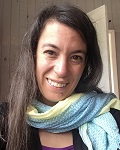2020
Elizabeth Shoffner
- Doctoral Candidate
- University of Washington

Abstract
In 2012, a conservation NGO purchased approximately 4,000 hectares in the Yabotí Biosphere Reserve of Misiones, Argentina, titling the majority to three Mbya Guarani communities. This resolution of Indigenous territorial rights—as communitarian property accessed through neoliberal conservation—has been hailed as an unprecedented and exemplary model of negotiation and multicultural alliance. Yet collaboration is also a contact zone and site of negotiation between world-making practices, impacting both environmental management and Indigenous sovereignty. Through content analysis, interviews, and 17 months of ethnographic research, this project traces these inter-epistemic encounters, examining the practices which render land legible as both Mbya territory and endangered subtropical forest through dominant legal and scientific regimes of property and conservation. While translation between unevenly positioned ontologies limits Mbya world-making possibilities and rearticulates settler colonial territoriality, Mbya territorial practices and continued illegibility produce spaces of Indigenous resurgence.

